but,however,while,although和though用法小结
- 格式:doc
- 大小:27.50 KB
- 文档页数:3
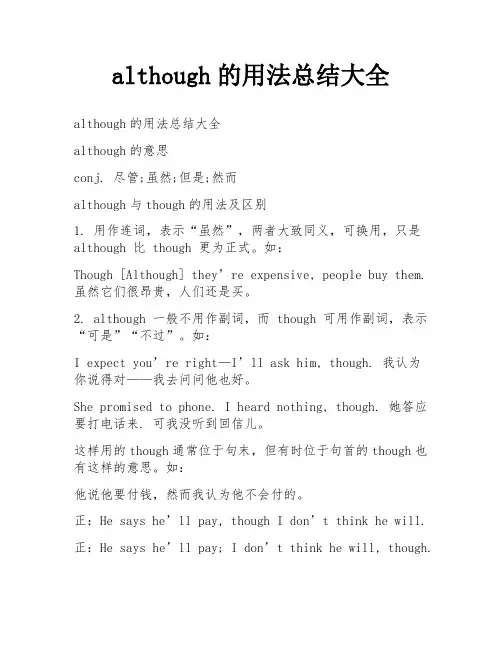
although的用法总结大全although的用法总结大全although的意思conj. 尽管;虽然;但是;然而although与though的用法及区别1. 用作连词,表示“虽然”,两者大致同义,可换用,只是although 比 though 更为正式。
如:Though [Although] they’re expensive, people buy them. 虽然它们很昂贵,人们还是买。
2. although 一般不用作副词,而 though 可用作副词,表示“可是”“不过”。
如:I expect you’re right—I’ll ask him, though. 我认为你说得对——我去问问他也好。
She promised to phone. I heard nothing, though. 她答应要打电话来. 可我没听到回信儿。
这样用的though通常位于句末,但有时位于句首的though也有这样的意思。
如:他说他要付钱,然而我认为他不会付的。
正:He says he’ll pay, though I don’t think he will.正:He says he’ll pay; I don’t think he will, though.3. 在 as though(好像,仿佛),even though(即使,纵然)等固定短语中,不能用 although代替though。
如:She treats me as though I were a stranger. 她待我仿佛我是一个陌生人。
He’s the best teacher even though he has the least experience. 他尽管经验最少,但教得最好。
4. 两者均可用于省略句,通常见于主句与从句主语相同,且从句谓语含有动词be的情形。
如:Although [Though] (it was) built before the war, the engine is still in perfect order. 尽管是战前制造的,这台发动机仍然处于良好状态。
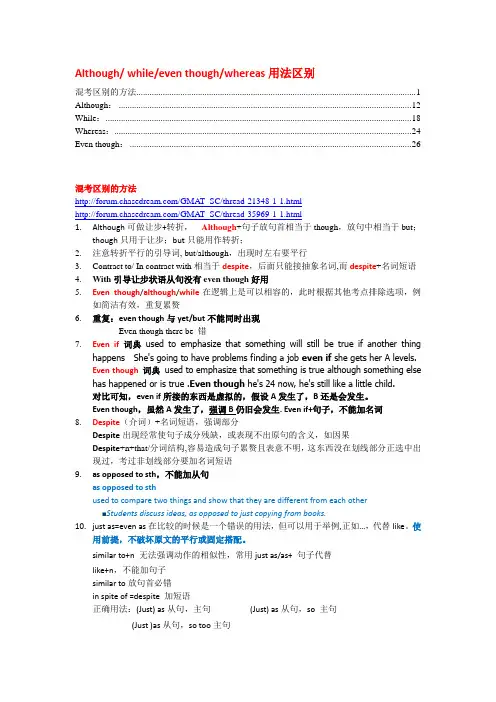
Although/ while/even though/whereas用法区别混考区别的方法 (1)Although: (12)While: (18)Whereas: (24)Even though: (26)混考区别的方法/GMAT_SC/thread-21348-1-1.html/GMAT_SC/thread-35969-1-1.html1.Although可做让步+转折,Although+句子放句首相当于though,放句中相当于but;though只用于让步;but只能用作转折;2.注意转折平行的引导词, but/although,出现时左右要平行3.Contract to/ In contract with相当于despite,后面只能接抽象名词,而despite+名词短语4.With引导让步状语从句没有even though好用5.Even though/although/while在逻辑上是可以相容的,此时根据其他考点排除选项,例如简洁有效,重复累赘6.重复:even though与yet/but不能同时出现Even though there be 错7.Even if词典used to emphasize that something will still be true if another thinghappens She's going to have problems finding a job even if she gets her A levels.Even though 词典used to emphasize that something is true although something else has happened or is true .Even though he's 24 now, he's still like a little child.对比可知,even if所接的东西是虚拟的,假设A发生了,B还是会发生。
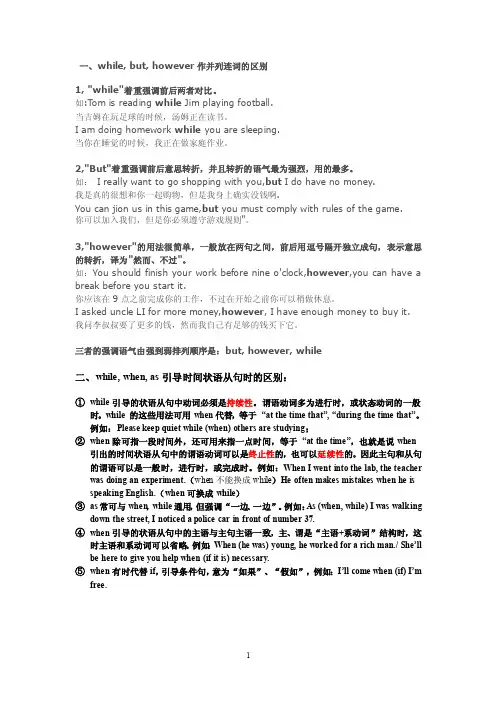
一、while, but, however作并列连词的区别1, "while"着重强调前后两者对比。
如:Tom is reading while Jim playing football.当吉姆在玩足球的时候,汤姆正在读书。
I am doing homework while you are sleeping.当你在睡觉的时候,我正在做家庭作业。
2,"But"着重强调前后意思转折,并且转折的语气最为强烈,用的最多。
如:I really want to go shopping with you,but I do have no money.我是真的很想和你一起购物,但是我身上确实没钱啊.You can jion us in this game,but you must comply with rules of the game.你可以加入我们,但是你必须遵守游戏规则"。
3,"however"的用法很简单,一般放在两句之间,前后用逗号隔开独立成句,表示意思的转折,译为"然而、不过"。
如:You should finish your work before nine o'clock,however,you can have a break before you start it.你应该在9点之前完成你的工作,不过在开始之前你可以稍做休息。
I asked uncle LI for more money,however, I have enough money to buy it.我问李叔叔要了更多的钱,然而我自己有足够的钱买下它。
三者的强调语气由强到弱排列顺序是:but, however, while二、while, when, as引导时间状语从句时的区别:①while引导的状语从句中动词必须是持续性。
谓语动词多为进行时,或状态动词的一般时。
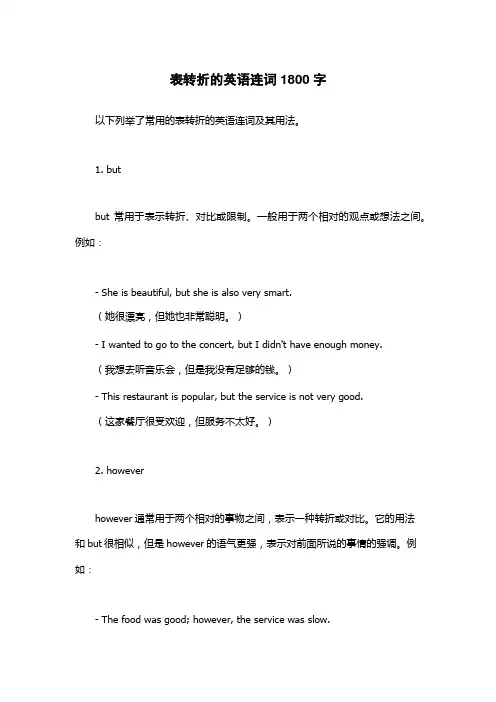
表转折的英语连词1800字以下列举了常用的表转折的英语连词及其用法。
1. butbut常用于表示转折、对比或限制。
一般用于两个相对的观点或想法之间。
例如:- She is beautiful, but she is also very smart.(她很漂亮,但她也非常聪明。
)- I wanted to go to the concert, but I didn't have enough money.(我想去听音乐会,但是我没有足够的钱。
)- This restaurant is popular, but the service is not very good.(这家餐厅很受欢迎,但服务不太好。
)2. howeverhowever通常用于两个相对的事物之间,表示一种转折或对比。
它的用法和but很相似,但是however的语气更强,表示对前面所说的事情的强调。
例如:- The food was good; however, the service was slow.(食物不错,但是服务比较慢。
)- She is very outgoing; however, she can also be a bit shy.(她很外向,但有时也会有点害羞。
)- I accidently deleted all my files; however, I was able to recover them later.(我不小心删除了所有的文件,但是后来我可以恢复它们。
)3. althoughalthough通常用来引出一个事实,并且这个事实看起来和后面说的事情不相符,表示转折的关系。
例如:- Although it was raining, he didn't bring an umbrella.(虽然下雨了,但他没带伞。
)- Although she is allergic to cats, she has three of them at home.(虽然她对猫过敏,但她家里有三只猫。
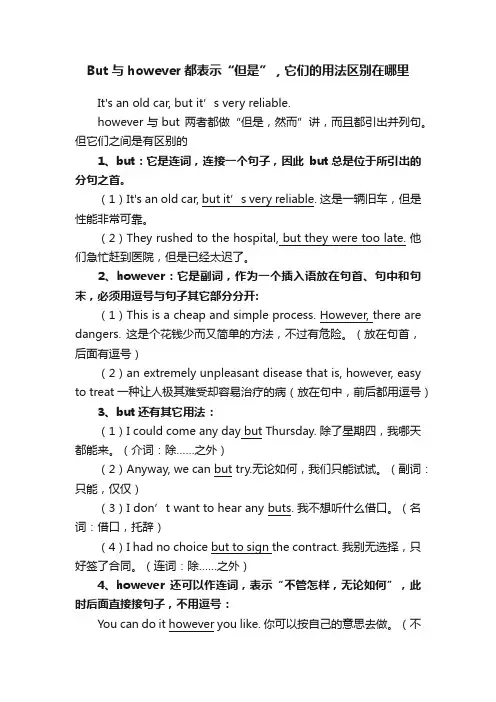
But与however都表示“但是”,它们的用法区别在哪里It's an old car, but it’s very reliable.however与but 两者都做“但是,然而”讲,而且都引出并列句。
但它们之间是有区别的1、but:它是连词,连接一个句子,因此but总是位于所引出的分句之首。
(1)It's an old car, but it’s very reliable. 这是一辆旧车,但是性能非常可靠。
(2)They rushed to the hospital, but they were too late. 他们急忙赶到医院,但是已经太迟了。
2、however:它是副词,作为一个插入语放在句首、句中和句末,必须用逗号与句子其它部分分开:(1)This is a cheap and simple process. However, there are dangers. 这是个花钱少而又简单的方法,不过有危险。
(放在句首,后面有逗号)(2)an extremely unpleasant disease that is, however, easy to treat 一种让人极其难受却容易治疗的病(放在句中,前后都用逗号)3、but还有其它用法:(1)I could come any day but Thursday. 除了星期四,我哪天都能来。
(介词:除……之外)(2)Anyway, we can but try.无论如何,我们只能试试。
(副词:只能,仅仅)(3)I don’t want to hear any buts. 我不想听什么借口。
(名词:借口,托辞)(4)I had no choice but to sign the contract. 我别无选择,只好签了合同。
(连词:除……之外)4、however还可以作连词,表示“不管怎样,无论如何”,此时后面直接接句子,不用逗号:You can do it however you like. 你可以按自己的意思去做。
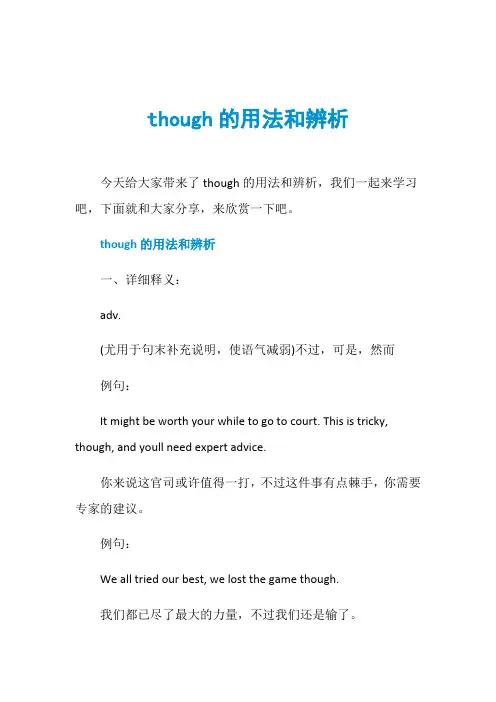
though的用法和辨析今天给大家带来了though的用法和辨析,我们一起来学习吧,下面就和大家分享,来欣赏一下吧。
though的用法和辨析一、详细释义:adv.(尤用于句末补充说明,使语气减弱)不过,可是,然而例句:It might be worth your while to go to court. This is tricky, though, and youll need expert advice.你来说这官司或许值得一打,不过这件事有点棘手,你需要专家的建议。
例句:We all tried our best, we lost the game though.我们都已尽了最大的力量,不过我们还是输了。
conj.尽管,虽然,即使例句:Its quite pleasant today, though the wind is rather cool.尽管风有点凉,今天天气还是很不错。
例句:Exhausted though he was, he was not ashamed to learn.他虽然年纪大了,但不耻于学习。
(用于主句后,引出补充说明,使语气变弱)不过,可是,然而例句:It might be worth your while to go to court. This is tricky, though, and youll need expert advice.你来说这官司或许值得一打,不过这件事有点棘手,你需要专家的建议。
例句:Honest advice, though unpleasant to the ear, benefits conduct.忠言逆耳利于行。
二、词义辨析:though,although,as这些连词均可表示“虽然,尽管”之意。
though和although 在意义上几乎毫无区别,但文体上后者是较正式用词,语气比though强。
此外,在习惯用法上这两个词仍有以下一些差异:1.though可引出倒装语序的让步状语从句,although 则不能。
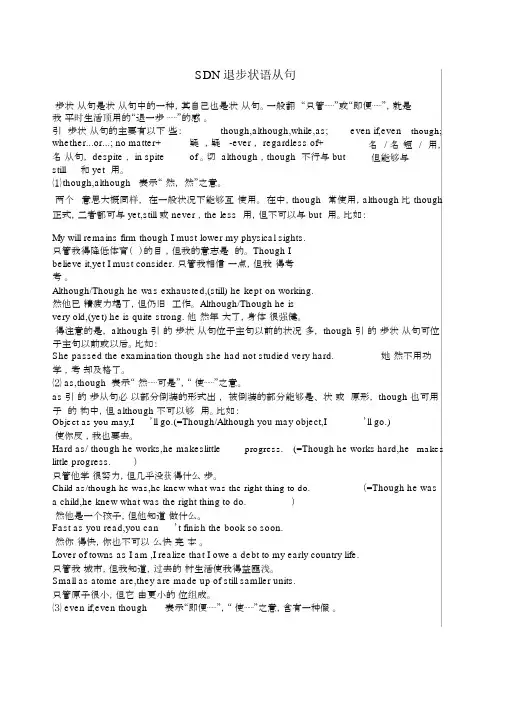
SDN退步状语从句步状从句是状从句中的一种,其自己也是状从句。
一般翻“只管⋯⋯”或“即便⋯⋯”,就是我平时生活顶用的“退一步⋯⋯”的感。
引步状从句的主要有以下些:though,although,while,as;even if,even though;whether...or...; no matter+疑,疑-ever,regardless of+名从句, despite , in spite of 。
切 although ,though 不行与 but still和 yet 用。
名 / 名短 / 用,但能够与⑴though,although 表示“ 然,然”之意。
两个意思大概同样,在一般状况下能够互使用。
在中,though 常使用,although比 though 正式,二者都可与 yet,still 或 never ,the less 用,但不可以与 but 用。
比如:My will remains firm though I must lower my physical sights.只管我得降低体育()的目,但我的意志是的。
Though Ibelieve it,yet I must consider. 只管我相信一点,但我得考考。
Although/Though he was exhausted,(still) he kept on working.然他已精疲力竭了,但仍旧工作。
Although/Though he isvery old,(yet) he is quite strong. 他然年大了,身体很强健。
得注意的是, although 引的步状从句位于主句以前的状况多, though 引的步状从句可位于主句以前或以后。
比如:She passed the examination though she had not studied very hard.她然不用功学,考却及格了。
⑵ as,though 表示“ 然⋯⋯可是”,“ 使⋯⋯”之意。
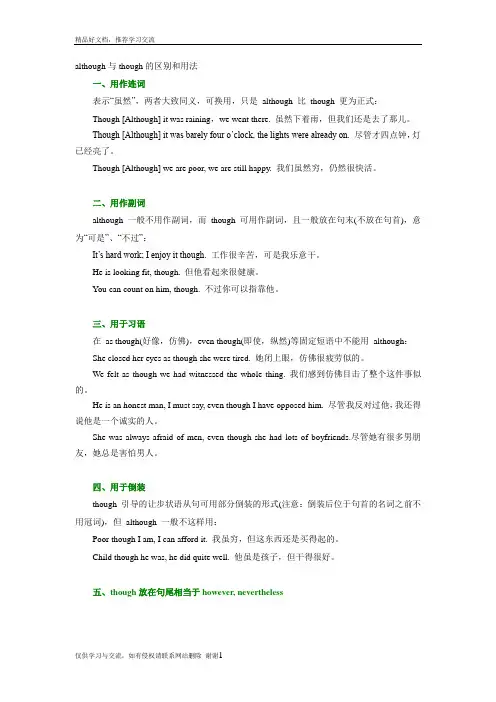
although与though的区别和用法一、用作连词表示“虽然”,两者大致同义,可换用,只是although 比though 更为正式:Though [Although] it was raining,we went there. 虽然下着雨,但我们还是去了那儿。
Though [Although] it was barely four o’clock, the lights were already on. 尽管才四点钟,灯已经亮了。
Though [Although] we are poor, we are still happy. 我们虽然穷,仍然很快活。
二、用作副词although 一般不用作副词,而though 可用作副词,且一般放在句末(不放在句首),意为“可是”、“不过”:It’s hard work; I enjoy it though. 工作很辛苦,可是我乐意干。
He is looking fit, though. 但他看起来很健康。
You can count on him, though. 不过你可以指靠他。
三、用于习语在as though(好像,仿佛),even though(即使,纵然)等固定短语中不能用although:She closed her eyes as though she were tired. 她闭上眼,仿佛很疲劳似的。
We felt as though we had witnessed the whole thing. 我们感到仿佛目击了整个这件事似的。
He is an honest man, I must say, even though I have opposed him. 尽管我反对过他,我还得说他是一个诚实的人。
She was always afraid of men, even though she had lots of boyfriends.尽管她有很多男朋友,她总是害怕男人。
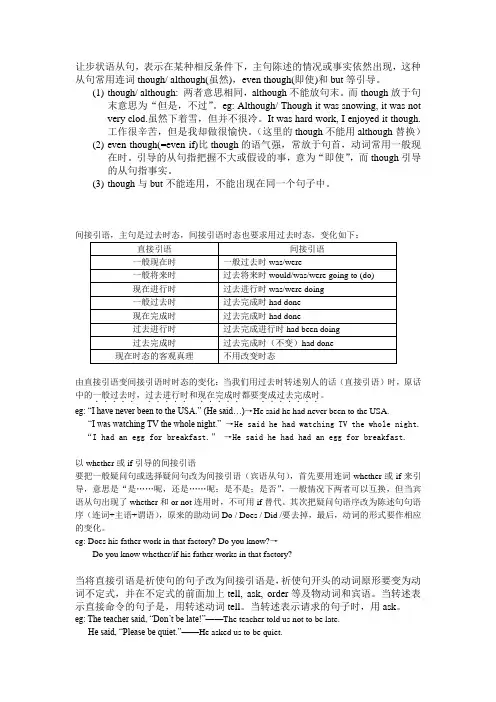
让步状语从句,表示在某种相反条件下,主句陈述的情况或事实依然出现,这种从句常用连词though/ although(虽然),even though(即使)和but等引导。
(1)though/ although: 两者意思相同,although不能放句末。
而though放于句末意思为“但是,不过”。
eg: Although/ Though it was snowing, it was not very clod.虽然下着雪,但并不很冷。
It was hard work, I enjoyed it though.工作很辛苦,但是我却做很愉快。
(这里的though不能用although替换)(2)even though(=even if)比though的语气强,常放于句首,动词常用一般现在时。
引导的从句指把握不大或假设的事,意为“即使”,而though引导的从句指事实。
(3)though与but不能连用,不能出现在同一个句子中。
间接引语,主句是过去时态,间接引语时态也要求用过去时态,变化如下:由直接引语变间接引语时时态的变化:当我们用过去时转述别人的话(直接引语)时,原话中的一般过去时.......。
.....都要变成过去完成时.....和现在完成时.....,过去进行时eg: “I have never been to the USA.” (He said…)→He said he had never been to the USA.“I was watching TV the whole night.”→He said he had watching TV the whole night. “I had an egg for breakfast.”→He said he had had an egg for breakfast.以whether或if引导的间接引语要把一般疑问句或选择疑问句改为间接引语(宾语从句),首先要用连词whether或if来引导,意思是“是……呢,还是……呢;是不是;是否”,一般情况下两者可以互换,但当宾语从句出现了whether和or not连用时,不可用if替代。
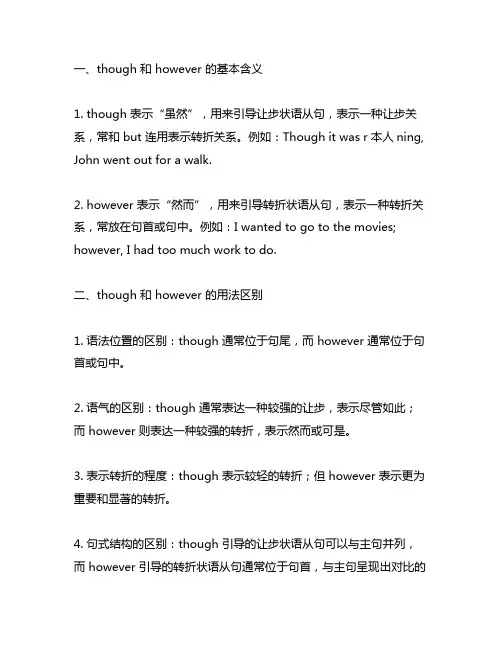
一、though 和 however 的基本含义1. though 表示“虽然”,用来引导让步状语从句,表示一种让步关系,常和 but 连用表示转折关系。
例如:Though it was r本人ning, John went out for a walk.2. however 表示“然而”,用来引导转折状语从句,表示一种转折关系,常放在句首或句中。
例如:I wanted to go to the movies; however, I had too much work to do.二、though 和 however 的用法区别1. 语法位置的区别:though 通常位于句尾,而 however 通常位于句首或句中。
2. 语气的区别:though 通常表达一种较强的让步,表示尽管如此;而 however 则表达一种较强的转折,表示然而或可是。
3. 表示转折的程度:though 表示较轻的转折;但 however 表示更为重要和显著的转折。
4. 句式结构的区别:though 引导的让步状语从句可以与主句并列,而 however 引导的转折状语从句通常位于句首,与主句呈现出对比的关系。
三、though 和 however 的用法实例比较1. 转折关系的使用示例:- Though it is r本人ning, we will still have a pic tomorrow. (虽然下雨,我们明天仍然要野餐。
)- I know that you want to go; however, I cannot allow it. (我知道你想去,但是我不能允许。
)2. 让步关系的使用示例:- Though she is young, she is very talented. (虽然她年轻,但她很有才华。
)- I will try to finish the project on time; however, I can't guarantee it. (我会努力按时完成这个项目,虽然我不能保证。
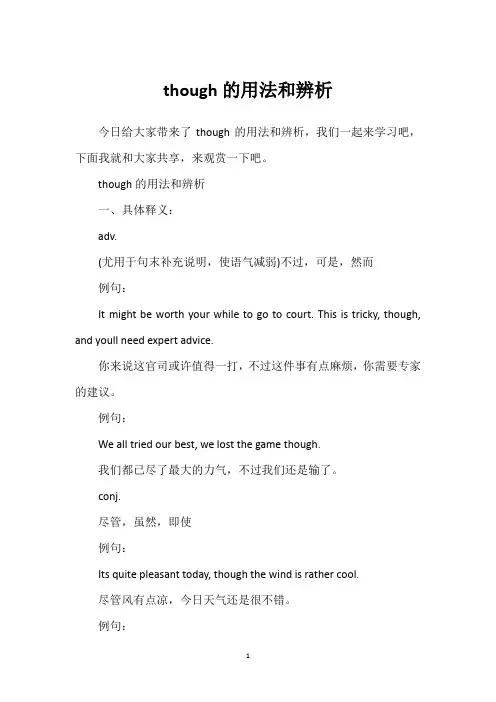
though的用法和辨析今日给大家带来了though的用法和辨析,我们一起来学习吧,下面我就和大家共享,来观赏一下吧。
though的用法和辨析一、具体释义:adv.(尤用于句末补充说明,使语气减弱)不过,可是,然而例句:It might be worth your while to go to court. This is tricky, though, and youll need expert advice.你来说这官司或许值得一打,不过这件事有点麻烦,你需要专家的建议。
例句:We all tried our best, we lost the game though.我们都已尽了最大的力气,不过我们还是输了。
conj.尽管,虽然,即使例句:Its quite pleasant today, though the wind is rather cool.尽管风有点凉,今日天气还是很不错。
例句:Exhausted though he was, he was not ashamed to learn.他虽然年纪大了,但不耻于学习。
(用于主句后,引出补充说明,使语气变弱)不过,可是,然而例句:It might be worth your while to go to court. This is tricky, though, and youll need expert advice.你来说这官司或许值得一打,不过这件事有点麻烦,你需要专家的建议。
例句:Honest advice, though unpleasant to the ear, benefits conduct.忠言逆耳利于行。
二、词义辨析:though,although,as这些连词均可表示“虽然,尽管”之意。
though和although在意义上几乎毫无区分,但文体上后者是较正式用词,语气比though强。
此外,在习惯用法上这两个词仍有以下一些差异:1.though可引出倒装语序的让步状语从句,although 则不能。
although与though的区别和用法一、用作连词表示“虽然”,两者大致同义,可换用,只是although 比though 更为正式:Though [Although] it was raining,we went there. 虽然下着雨,但我们还是去了那儿。
Though [Although] it was barely four o’clock, the lights were already on. 尽管才四点钟,灯已经亮了。
Though [Although] we are poor, we are still happy. 我们虽然穷,仍然很快活。
二、用作副词although 一般不用作副词,而though 可用作副词,且一般放在句末(不放在句首),意为“可是”、“不过”:It’s hard work; I enjoy it though. 工作很辛苦,可是我乐意干。
He is looking fit, though. 但他看起来很健康。
You can count on him, though. 不过你可以指靠他。
三、用于习语在as though(好像,仿佛),even though(即使,纵然)等固定短语中不能用although:She closed her eyes as though she were tired. 她闭上眼,仿佛很疲劳似的。
We felt as though we had witnessed the whole thing. 我们感到仿佛目击了整个这件事似的。
He is an honest man, I must say, even though I have opposed him. 尽管我反对过他,我还得说他是一个诚实的人。
She was always afraid of men, even though she had lots of boyfriends.尽管她有很多男朋友,她总是害怕男人。
Althoughwhileeventhoughwhereas用法区别Although/ while/even though/whereas用法区别混考区别的方法 (1)Although: (12)While: (18)Whereas: (25)Even though: (26)混考区别的方法/doc/9a992326.html,/GMAT_SC/threa d-21348-1-1.html/doc/9a992326.html,/GMAT_SC/threa d-35969-1-1.html1.Although可做让步+转折,Although+句子放句首相当于though,放句中相当于but;though只用于让步;but只能用作转折;2.注意转折平行的引导词, but/although,出现时左右要平行3.Contract to/ In contract with相当于despite,后面只能接抽象名词,而despite+名词短语4.With引导让步状语从句没有even though好用5.Even though/although/while在逻辑上是可以相容的,此时根据其他考点排除选项,例如简洁有效,重复累赘6.重复:even though与yet/but不能同时出现Even though there be 错7.Even if词典used to emphasize that something will still be true if another thinghappens She's going to have problems finding a job even if she gets her A levels.Even though 词典used to emphasize that something is truealthough something else has happened or is true .Even though he's 24 now, he's still like a little child.对比可知,even if所接的东西是虚拟的,假设A发生了,B还是会发生。
though的用法和辨析今天给大家带来了though的用法和辨析,我们一起来学习吧,下面就和大家分享,来欣赏一下吧。
though的用法和辨析一、详细释义:adv.(尤用于句末补充说明,使语气减弱)不过,可是,然而例句:It might be worth your while to go to court. This is tricky, though, and youll need expert advice.你来说这官司或许值得一打,不过这件事有点棘手,你需要专家的建议。
例句:We all tried our best, we lost the game though.我们都已尽了最大的力量,不过我们还是输了。
conj.尽管,虽然,即使例句:Its quite pleasant today, though the wind is rather cool.尽管风有点凉,今天天气还是很不错。
例句:Exhausted though he was, he was not ashamed to learn.他虽然年纪大了,但不耻于学习。
(用于主句后,引出补充说明,使语气变弱)不过,可是,然而例句:It might be worth your while to go to court. This is tricky, though, and youll need expert advice.你来说这官司或许值得一打,不过这件事有点棘手,你需要专家的建议。
例句:Honest advice, though unpleasant to the ear, benefits conduct.忠言逆耳利于行。
二、词义辨析:though,although,as这些连词均可表示“虽然,尽管”之意。
though和although 在意义上几乎毫无区别,但文体上后者是较正式用词,语气比though强。
此外,在习惯用法上这两个词仍有以下一些差异:1.though可引出倒装语序的让步状语从句,although 则不能。
but, however, while, although和though用法小结【观察】阅读下列句子,注意各句中黑体单词的用法。
1. We have made some achievements,butwe should be modest.2. He promised to help me.However, he is busy and hasn’t come.3. She felt ill. She went to work,however, and tried to concentrate.4. He said that it was so; he was mistaken,however.5. You like sports,whileI’d rather read.6.WhileI understand what you say, I can’t agree with you.7.Although / Thoughit was late, she went on working.8. Tiredthoughhe was, he went on working.9.Althoughhe’s got a good job now, he still complains.10. She promised to phone. I heard nothing,though.【归纳总结】★but与however均可表示转折,意为“但是,然而”,都可以引出表转折意义的句子(句1-句4),但二者用法也有区别:1.从语义上看,but所表示的是非常明显的对比,转折的意味较however要强。
2.从语法上看,but是个并列连词,而however却是个连接副词(句2-句4)。
3.从语序上看,but总是位于它所引出的分句之首,而however可位于句首、句中或句尾。
4.从标点上说,but之后一般不使用逗号,但however则通常用逗号与句子其他部分分开。
although与though的用法解析一、用作连词表示“虽然”,两者大致同义,可换用,只是although 比though 更为正式:Though [Although] it was raining,we went there. 虽然下着雨,但我们还是去了那儿。
Though [Although] it was barely four o’clock, the lights were already on. 尽管才四点钟,灯已经亮了。
Though [Although] we are poor, we are still happy. 我们虽然穷,仍然很快活。
二、用作副词although 一般不用作副词,而though 可用作副词,且一般放在句末(不放在句首),意为“可是”、“不过”:It’s hard work; I enjoy it though. 工作很辛苦,可是我乐意干。
He is looking fit, though. 但他看起来很健康。
You can count on him, though. 不过你可以指靠他。
三、although引导的从句放在主句前后均可,有时还可放在句中。
Although many difficulties are still ahead, we are determined to make greater achievements. 尽管在前面的道路上还有许多困难,但是,我们决心要取得更大的成就。
He often helps me with my English although he is quite busy. 尽管他相当忙,但是还常常帮我学英语。
四、although引导的从句不能与but, however连用,但可与yet, still连用。
不能说:Although he was old, but he worked hard. 应把but去掉。
当然,保留but而去Although也可。
关于Although的用法介绍下面店铺为大家介绍Although的一些用法:1.表示“虽然”时,不要根据汉语习惯,在后面使用连词but, 不过有时它可与 yet, still, nevertheless 等副词连用。
如:他虽然年纪很大了,但还很强壮。
正:Although he is very old, (yet) he is quite strong.误:Although he is very old, but he is quite strong.但是在一定的上下文中,类似下面的although 与but 连用的句子是可能的 (注意 but 引出的句子在although 从句之前) 。
如:But Ididn’t know that then, although I learned it later. 但我当时的确不知道此事,尽管后来还是知道了。
2. 不能用于 as though (好像),even though (即使) 等习语中代替 though, 也不用于让步状语的倒装形式中。
3. 若主从句主语相同,且从句谓语含有动词be, 可将从句主语和动词 be 省略。
如:Although (he is) quite young, he knows a lot. 虽然很年轻,但他很懂事了。
In any case, she was very lovablealthough not at all tidy. 不管怎么讲,她还是很可爱的,尽管一点也不爱干净。
4. 有时用于主句之后,起补充说明的作用,相当于 however, but。
如:He is poor-- although he is well contented. 他很穷,然而却能知足常乐。
The price increase will obviously be unpopular, although it’s unlikely to reduce demand. 价格升高显然会不受人欢迎,然而这不大可能会降低人们的需求。
but, however, while, although和though用法小结
【观察】阅读下列句子,注意各句中黑体单词的用法。
1. We have made some achievements, but we should be modest.
2. He promised to help me. However, he is busy and hasn’t come.
3. She felt ill. She went to work, however, and tried to concentrate.
4. He said that it was so; he was mistaken, however.
5. You like sports, while I’d rather read.
6. While I understand what you say, I can’t agree with you.
7. Although / Though it was late, she went on working.
8. Tired though he was, he went on working.
9. Although he’s got a good job now, he still complains.
10. She promised to phone. I heard nothing, though.
【归纳总结】
★but与however均可表示转折,意为“但是,然而”,都可以引出表转折意义的句子(句1-句4),但二者用法也有区别:
1. 从语义上看,but所表示的是非常明显的对比,转折的意味较however要强。
2. 从语法上看,but是个并列连词,而however却是个连接副词(句2-句4)。
3. 从语序上看,but总是位于它所引出的分句之首,而however可位于句首、句中或句尾。
4. 从标点上说,but之后一般不使用逗号,但however则通常用逗号与句子其他部分分开。
★连词while的用法
1. 引导表对比关系的并列句,意为“而,然而”(句5)。
2. 引导让步状语从句,意为“虽然,尽管”,多放在句首(句6)。
★although与though的用法
1. although与though用作连词时,意为“虽然,尽管”,引导让步状语从句(句7)。
although在大多数情况下可与though通用。
但在正式文体中,though可用于一种不以其为首的让步状语从句,这种从句须以形容词等开头,整个从句须置于主句之前(句8),这时although不能替换though。
2. although / though引导从句时,主句不可再使用but, however等,但可出现副词still等(句9)。
3. though可用作副词,意为“可是,不过”,一般放在句末(句10),但although 一般不用作副词。
【即学即练】从A、B、C、D四个选项中,选出可以填入空白处的最佳选项。
1. I was glad to meet Jenny again, _____ I didn’t want to spend all day with
her. (2013新课标全国卷II)
A. but
B. and
C. so
D. or
2. There’s no way of knowing why one man makes an important discovery _____ another man, also intelligent, fails. (2013新课标全国卷I)
A. since
B. if
C. as
D. while
3. _____ small, the company has about 1,000 buyers in over 30 countries. (天津2013)
A. As
B. If
C. Although
D. Once
4. Queen Elizabeth Ⅱ is often thought to be the richest woman in the world. _____, her personal wealth seems rather small. (安徽2012)
A. Besides
B. Otherwise
C. However
D. Altogether
5. _____ I always felt I would pass the exam, I never thought I would get an A. (湖南2012)
A. While
B. Once
C. If
D. Until
答案
【即学即练】1-5 ADCCA。